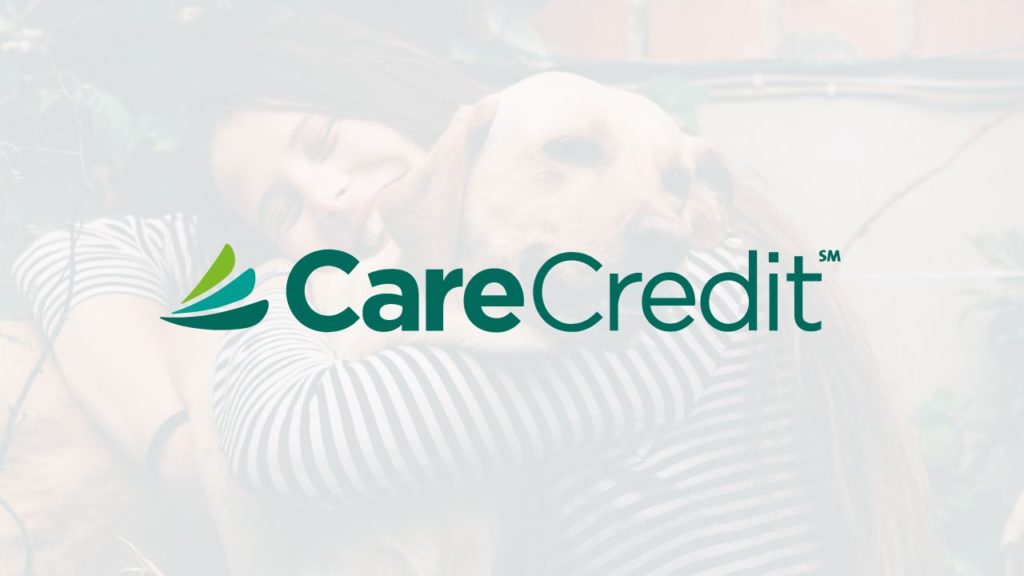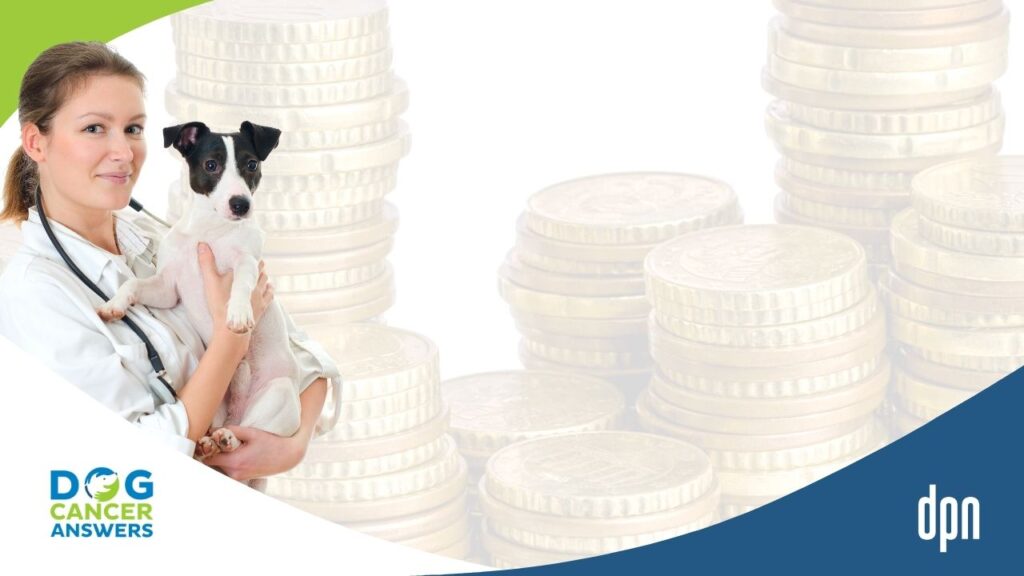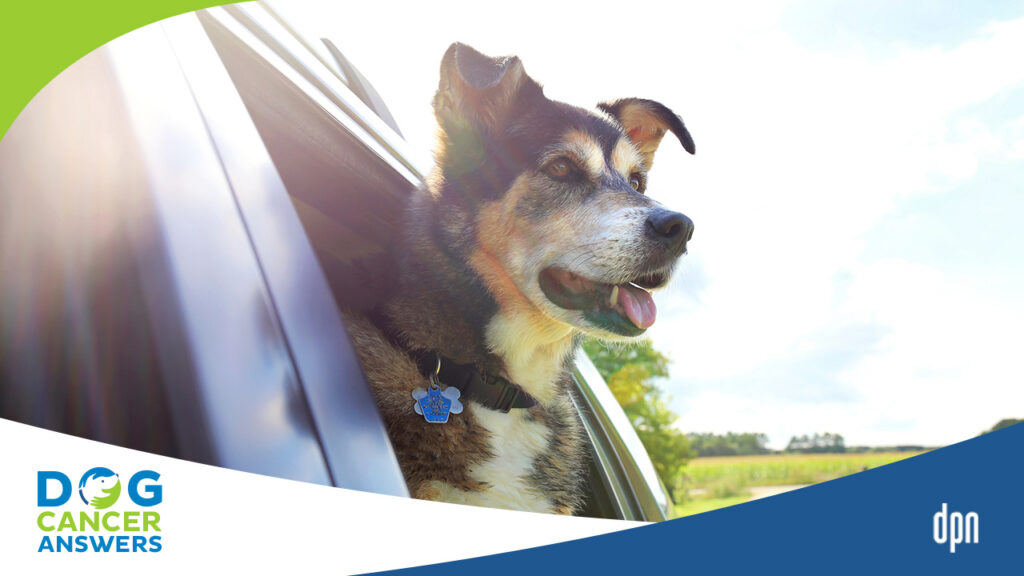EPISODE 122 | RELEASED June 7, 2021
I’m Flat Broke … And I Want to Save My Dog! │ Molly Jacobson Deep Dive
How do we cope when we can’t afford to treat our dog’s cancer? Molly Jacobson joins us to discuss financial help for dog cancer, as well as how to handle the guilt that comes with feeling so helpless.
SHOW NOTES
When you can’t afford surgery for your dog, have to pay vet bills with money you don’t have, or can’t afford to go to the vet at all, it feels awful. And others can judge you, making everything worse.
So what do you do if you can’t afford – or don’t want to spend your money on – dog cancer treatments?
Molly Jacobson joins us to discuss outside-the-box financial help … and also how to handle the difficult conversations around paying for dog cancer.
>> Announcer: [00:00:00] DPN Logo
>> Molly Jacobson: [00:00:02] There are so many things that you have to manage, and that’s a reality. And you are not a bad person for thinking about that pragmatically and saying, do I really have the emotional budget really? Or the time budget for this. In addition to the money.
>> Announcer: [00:00:20] Welcome to Dog Cancer Answers, where we help you help your dog with cancer.
Here’s your host, James Jacobson,
>> James Jacobson: [00:00:28] Hello friend, today, we have a very special guest in the studio with me, which is a nice thing these days in the world of the pandemic and doing everything remotely. And we’re going to be discussing a topic that a lot of people find difficult to articulate. And basically the gist is I’m flat broke, and I want to save my dog, but I don’t want to turn this into a total economic decision, but money is very much tied into the decisions of how I should treat my dog. So joining us today to discuss that is Molly Jacobson, who is editor of The Dog Cancer Survival Guide, which is the show’s sponsor. And I guess fair warning, uh, is related to me.
How are we related?
>> Molly Jacobson: [00:01:14] We are married.
>> James Jacobson: [00:01:15] Ahh, that’s how I know you. Welcome to Dog Cancer Answers, Molly. So yeah, the question really is this sense that people feel like, oh my gosh, I got this cancer diagnosis. The veterinarian told me it’s going to cost X amount of money to do this procedure and perhaps more to do this procedure, depending upon the results of the first procedure.
And it just sounds like a lot of money, but I feel kind of guilty if I don’t treat my dog. So what’s your advice?
>> Molly Jacobson: [00:01:50] Well, obviously I can’t give specific advice for specific cases because every case is different. And I think that’s my main advice, is just to remember that you are a specific person, you have a specific dog with a specific cancer.
And there is literally no one else on the planet who knows the situation better than you do. And so what you want to do and what you think is right for you and your dog is the only right answer to the question. And so your task is not so much to worry about what other people think, which I know is a big deal, right? Like, of course you’re worried about it, but really,
>> James Jacobson: [00:02:26] But people always wonder about like, you know, what are others thinking? And is the veterinarian judging me or is my family judging me? Because they know that Rover has this diagnosis and it’s going to cost, I don’t know, $3,000 because the average cost still the last I saw was eight to $10,000 to treat canine cancer. If you treat it conventionally,
>> Molly Jacobson: [00:02:46] Right. Even if you don’t treat it conventionally, it still adds up. Cooking for your dog costs money. It’s sometimes more than cheap kibble. It also takes time. You may or may not have the time to cook for your dog. Supplements, seem inexpensive when you first buy them. But sometimes people think I only have a month or two left.
My vet says, so it’s not a big deal. Then three months later, four months later, a year later, they look back and say, wow, I’ve spent a lot of money just on food and supplements, even though I didn’t do the chemo that my vet suggested. So they’re happy that their dog is still alive, obviously, but they still put out a good sum of money, even just for those less expensive treatments.
I mean, treating any illness, always cost money. Just the tests can cost a lot. You can spend a thousand dollars just to find out if your dog has cancer, let alone to treat it. So sometimes people just feel like, wait, this is a huge expense. I wasn’t expecting it and I genuinely don’t know how to handle it.
And at least in the U.S., there isn’t health insurance for most of it. So you’re paying for everything out of pocket.
>> James Jacobson: [00:03:50] So what kind of financial help is there for people?
>> Molly Jacobson: [00:03:53] Well, there actually is quite a bit, Dr. Dressler wrote an entire chapter on financial resources in his book, and actually that same chapter is available for free on DogCancerBlog.
So I’ll make sure that I put a link in the show notes to that on the blog. But just as to give you some ideas, like the first thing to do is just to tell your vet that you need some financial help. You can ask for payment plans. A lot of vets will do that. Another thing that Dr. Dressler recommends, that I don’t know how many vets would be open to this, but he can be in certain circumstances is to do a trade, [laugh] right?
>> James Jacobson: [00:04:28] Like I’ll give you some chicken and eggs if you fix my dog?
>> Molly Jacobson: [00:04:30] Right, exactly, like, maybe you’re a bookkeeper or you clean houses or you own a restaurant. If there’s something that the veterinarian needs in their own life or in their business life then maybe they will do a trade. If it’s a true trade where it’s, you know, dollar for dollar, I’m giving you this, which costs this much.
And you’re giving me that, which costs that much, then that can really work out well for people. But of course, you know, I’d check with your accountant because even barters can be taxable events.
>> James Jacobson: [00:05:00] Oh, I think so, yeah.
>> Molly Jacobson: [00:05:01] Yeah, so that’s something to keep in mind. There’s also Care Credit. That’s a healthcare card.
>> James Jacobson: [00:05:06] That’s debt though.
>> Molly Jacobson: [00:05:07] Yeah. That’s debt. Now it’s interest free for a certain period of time. And as long as you pay it off within the agreed upon time, then you’re not incurring extra costs, but then just like any kind of, you know, like electronic stores do these cards and furniture stores will do the same kind of credit arrangements where yeah, it’s interest free for a year. You pay off your $7,000 debt within that time. No harm, no foul. But if you miss a payment or if you don’t pay it off on time, then you know, oh, it’s 35% interest or whatever it is. It’s quite high and the fees can be really hefty. So that’s also something to think about.
>> James Jacobson: [00:05:45] What else.
>> Molly Jacobson: [00:05:46] Let’s see. There are clinical trials. We just did a show about those. So there might be a clinical trial that you could join in your area.
>> James Jacobson: [00:05:54] We’ll put a link to that show as well.
>> Molly Jacobson: [00:05:56] Absolutely. Some folks set up, GoFundMe’s, you know, for their dog’s cancer. If you have a community of people who you know would pitch in a few dollars to help, that can be really helpful, but I think that’s kind of dicey and you have to be the kind of person who’s comfortable, you know,
>> James Jacobson: [00:06:11] Announcing that
>> Molly Jacobson: [00:06:11] Right. You’re doing a fundraiser for your dog’s cancer, but hey, you know, there are plenty of people who do, and that’s certainly a totally valid way to raise money. And then of course there are foundations and there are nonprofits that give loans, or grants, to people whose dogs have cancer. They usually have really, really strict requirements.
Like your dog has to have a certain kind of cancer, or you have to have a prognosis of, you know, at least a year’s worth of extra life, if you treat. And if you don’t get that prognosis from your vet, then they won’t fund your, you know, they’re not just going to fund any cancer treatment. They’re going to fund ones that where the vet has a really solid feeling that it’s going to work out in the long run.
>> James Jacobson: [00:06:53] How do you find those foundations and those grants?
>> Molly Jacobson: [00:06:56] So the list of foundations, there’s a list in the chapter, that’s on the blog and we have updated that last blog post. So the website version of that chapter is, is up-to-date
>> James Jacobson: [00:07:06] More accurate up-to-date okay.
>> Molly Jacobson: [00:07:08] Yeah. Yeah. So those are all ways you can fund cancer care that don’t involve going directly into your own pocket.
But again, this is just a super personal decision. Some folks look at all of those resources and they still feel defeated and overwhelmed. And that’s when I think something else might be going on. You know, sometimes our feeling of, uh, just can’t afford this, is less about the amount of money and more about whether we really want to spend our money that way.
But we don’t want to say that out loud.
>> James Jacobson: [00:07:38] Huh? You know, I don’t want to say my dog isn’t worth me going into debt for $5,000. I’m worried about what other people will think if I say that out loud.
>> Molly Jacobson: [00:07:49] Right. And so there are people who will look at that number and say, well, that’s nothing. I’d spend 50 times that to save the life of my dog.
And there are other people who will look at that and say, You’re absolutely insane if you even think of spending a quarter of that on your dog. And those people have those opinions and that’s fine, they have an opinion, but in the end, you’re the person who has to care for that dog. And there are so many more factors that go into this decision, in my experience, than money. Money, of course is a huge part of this.
But the real question I think people are asking is will people judge me for the money? When I’m making the decision based on all of those other factors.
>> James Jacobson: [00:08:34] Okay. So let’s explore that. So is that the underlying psychology that you think people are dealing with? Is that like, they’re going to think it’s because I’m just cheap, when in fact I have this reason and this reason. And what are some of those reasons?
>> Molly Jacobson: [00:08:51] Oh, absolutely. I think a lot of people worry about the money because it’s a concrete, pragmatic thing to think about and then feel like it’s the driving factor behind their guilt. And so I want to remind, you know, anybody who’s listening to this, that there are so many other things that are happening, like other factors would include, Hey, how many jobs do you have to work to put a roof over your head, and your dog’s head? Right, how much time do you have? There are people who are retired and spend all day long with their dog. There are people who work from home. And then there are people who have to work 40, 50, 60 hours a week. And they literally don’t have the time. They are people who have other people in their lives to take care of.
There are people who have chronic illnesses themselves, that make it difficult to care for their dog. And all of those factors go into this. It’s not just about money. It’s about time. It’s about emotional management. I’ve heard in our Facebook support group, which by the way, anybody listening to this who’s dealing with dog cancer should join, Dog Cancer Support on Facebook, it’s a great group. You know, someone posted sometime last year about how she was pregnant with her first baby. She just had a dog diagnosed with cancer. The dog was 11 and was, I think, a larger breed, like maybe a Labrador, so had already outlived their average lifespan. And she was looking at this dog who was the love of her life, and she considered her first child, and saying, how can I possibly not do everything I can to save my first child? But also I’m about to have a baby within the next two weeks. I don’t have time. And so the decision about whether, and I don’t remember any more details, so I can’t really speak to what choice she made, but I know that in that circumstance, you have to think ahead and you have to think, okay, I have the baby. I have the dog. I’ve committed to this long course of treatment that requires intense at home care, no matter what kind of care you’re doing for a dog with cancer, there’s a lot of work that goes into it. There’s sleepless nights. There are things that, you know, the dog might stop eating and then you panic and you want to feed the dog. There’s so many things that you have to manage, and that’s a reality. And you are not a bad person for thinking about that pragmatically and saying, do I really have the emotional budget? Really. The emotional budget for this, or the time budget for this. And in addition to the money.
>> James Jacobson: [00:11:20] Okay, Molly, I’m going to stop you right here, but, uh, we’re going to hear from our sponsors and we’ll be right back.
And we are back speaking with the editor of The Dog Cancer Survival Guide, Molly Jacobson. Okay. So separating the money from all of this and looking at the time. And one of the things that Dr. Dresser talks about in The Dog Cancer Survival Guide is this whole issue of average life expectancy. And how much more time am I going to get with my dog by doing this treatment versus that treatment.
>> Molly Jacobson: [00:12:01] Right.
>> James Jacobson: [00:12:02] Talk about that.
>> Molly Jacobson: [00:12:03] One of the most important pieces of advice that Dr. Dressler gives, and I’ve heard him say it in several podcasts as well, that you need to ask your veterinarian or your oncologist, those tough questions. Like I understand you want to do this surgery.
What is the realistic time that we’re going to get out of it? Like, what is the actual result I’m going to get? Not just do you think you can remove the tumor, but also how much more time will it give me. How much more quality of life will it give me. What are we actually getting out of this? Because if you do a surgery or a course of chemo, or course of radiation, or, you know, change the diet or any of the other strategies that Dr. Dressler recommends in the book, there are going to be pros and cons to all of those. And you need to know what they are ahead of time in order to make an informed decision.
>> James Jacobson: [00:12:53] So if you get, I don’t know, say in this hypothetical six more months and the surgery cost $4,000 all in, are you a monster to basically say, okay, well, six months into 4,000, that’s this much per month, which is this much per day, is my dog worth it?
>> Molly Jacobson: [00:13:14] Oh, God, isn’t that terrible? That feelings
>> James Jacobson: [00:13:16] It feels like an economic decision.
>> Molly Jacobson: [00:13:18] Right? My heart just
>> James Jacobson: [00:13:18] Which is based on so many hypotheses.
>> Molly Jacobson: [00:13:20] Right. And my heart just broke thinking of my dog’s life as like a certain number of dollars a day. Right. And so for me, what I think is best, is to think if someone asked me right now, You’re guaranteed another six months with your dog.
Give me $4,000. Would I say yes and then put yourself four months from now. If the dog passes away. And you didn’t get the six months that you were hoping for, cause there are no guarantees for any of these things.
>> James Jacobson: [00:13:51] Right.
>> Molly Jacobson: [00:13:52] And say, am I mad at myself that I spent that $4,000 and I didn’t get what I wanted.
And if you can imagine yourself being really upset about that. I would take that as a reason to really seriously think, maybe it’s not worth it to me.
>> James Jacobson: [00:14:07] So this is really a little bit about this concept of doing hypotheticals in your own mind, thinking forward, how would I feel if I did get the six months or if I got the 12 months, my God, it’s a bargain.
I thought it would be cost and I’m getting this much extra. Or, but if I only got one month, how would I feel about it? If you’re going to play this intellectual game of how much is a day of my dog’s life worth. I think the extension of that is while you’re doing these thought experiments, if you look at other less costly options, like, palliative care, which is, you know, just comfort care. Cause that is significantly less expensive. Right?
>> Molly Jacobson: [00:14:50] Generally, that is less expensive and the interesting thing about palliative care, based on the chapter in the book, and also, I know this has been true. We’ve seen it in our own family, that someone who chooses to focus on palliative care, something about feeling better, makes a body, whether it’s a human body or a dog body, seem to do a little bit better over the long run and in the end can even extend life beyond what would have been expected.
>> James Jacobson: [00:15:20] This is the argument for hospice in humans, or sometimes called pawspice in the veterinary space,
>> Molly Jacobson: [00:15:26] Right.
>> James Jacobson: [00:15:26] Where you put a loved one into the hospice program or they decide I am going to go into hospice.
I really don’t want to treat with every aggressive thing. And then they kind of way outlive their expectancy, even if they had done the conventional treatment, because they’re so focused on quality of life.
>> Molly Jacobson: [00:15:43] Right. And when you have a good quality of life, then often you feel better. And if you feel better, you have more live for, and I think psychologically it boosts your immune system.
And I’m sure this is incredibly complex. There’s a million things and a lot we don’t know, but that seems to be the trend. As you know, we have a good friend, who’s a hospice doctor and this has definitely been something we’ve talked with him about. So I think that one thing to keep in mind too, is that there are people.
I’m not going to name names, but there’s a literal billionaire who many years ago paid for Dr. Dressler to fly to the mainland and examine his dog in person and consulted with him to decide whether or not to do a whole variety of, uh, conventional, there was like an oncology, all sorts of oncologists on board as well.
And there were all sorts of surgeries and chemo and radiation treatments that he could have chosen to do. And he didn’t do all of them. He didn’t end up doing all of them, even though he had unlimited funds, nothing was too expensive for him. Everything was on the table, but he still chose not to do everything. Because, in the end, he had other factors he was bringing in.
And then there are people who, you know, are living paycheck to paycheck, who go and open up a Care Credit account, in order to pay for $8,000 worth of surgeries and they don’t regret it because for them, that was a good use of those funds. And so this is not about the dollar amount, as much as it is about who you are, who your dog is and what kind of health status we’re looking at and what their other problems are, how old they are.
There’s so many factors to think about that I don’t think we can ever judge anybody, for the actual choice they make, honestly, I just, I can’t ever say to somebody, oh, it’s time.
>> James Jacobson: [00:17:35] Talking about judging people. What about people who think you’re crazy or I’m crazy for spending this money in my dog and others think I’m not spending enough.
How do you divorce other people’s opinions? And this is sort of a, a broader question than the scope of the show, but how do you separate other people’s opinions in this cloud so that you can have the clarity to do the right thing for your dog.
>> Molly Jacobson: [00:18:02] I think that is a really, really tough thing to do. A lot of us are not used to setting aside what other people think about us.
Um, you know, we really care about that and we worry about it. However, I personally think when it comes to any major life decision, in the end, it’s really only what you decide that’s important. The way that I would advise somebody is to literally not talk about it with people who don’t understand,
>> James Jacobson: [00:18:28] Just don’t talk about it.
>> Molly Jacobson: [00:18:29] Yeah.
>> James Jacobson: [00:18:29] So if they ask, what do you say.
>> Molly Jacobson: [00:18:32] If they ask, I would say, you know, we’re weighing our options. You know, I mean, I’m working on that with my veterinarian. You know, one thing that I’ve heard people say is I’m taking this into the silence. Or I’m praying on it, or I haven’t made that decision yet. I’m thinking deeply about it.
When you say things like that. You’re indicating to the other person that you’ve got this.
>> James Jacobson: [00:18:55] Yeah. Don’t worry about it.
>> Molly Jacobson: [00:18:57] You’re not just making a whimsical decision. You’re not making a whatever decision you come to will be one that you’ve thought through.
>> James Jacobson: [00:19:04] Okay, well as a language expert, Molly, cause you are, is there a good way of languaging the question that sometimes you want to ask a veterinarian, but just don’t know how to say it, which is effectively. Okay. I got that. That’s like the Grade A option, but is there a less expensive way of doing what you want to do without the vet thinking you’re a jerk?
>> Molly Jacobson: [00:19:28] Well, yeah, I think that, you know, one of the things, it seems to me from my conversations with many veterinarians over the last decade or so, not just Dr. Dressler, but many others. You know, everybody who walks in the door has a different attitude about money and about their pet’s care. So one person will be offended if you ask them, to give another option. And another person, you know, will say, how come you didn’t tell me that I could have tested for this thing or that thing, or this surgery was an option. Money’s not,
>> James Jacobson: [00:19:59] Why didn’t you catch this earlier.
>> Molly Jacobson: [00:20:00] Right. Why didn’t you run a million tests before we did this? You know, it’s very difficult. So they’re always juggling different people. So my recommendation is actually to be very clear with your veterinarian about who you are as a person, before you ask your questions so that they know, like, say something like.
Look, I’m ready to take the information from you straight. I want to make the best decision. And so I need a little bit more information and I’m emotionally ready to handle whatever it is you throw at me. And if I start to cry, don’t worry. You know, I’m okay. And then just ask your question directly what you want, because I think sometimes they’re worried that, I mean, people get really mad at vets sometimes, and not for things that are the vet’s fault, but they have to deal with a lot of upset people.
And so sometimes they maybe pull their punches a little bit.
>> James Jacobson: [00:20:50] So what words would you use.
>> Molly Jacobson: [00:20:52] Well, I think it would depend on the situation. So for example, you said a less expensive option. Say, okay, so there’s this surgery. I understand. It’s probably going to cost several thousand dollars. I’m concerned my dog is older and that we might not have that much more time left anyway.
And I’m not sure I want to commit to the, not just the cost, but also all of the recovery time and the anesthetic risks of a surgery right now. Is there any other option on the table that maybe is less recovery time or is easier on my dog and might also be a little easier on my wallet? Something a little bit more within my reach.
>> James Jacobson: [00:21:32] And literally just say that, like, talk about the wallet, because I mean, in fact, one of the things that I always am reminded that I read a long time ago, that the entire veterinary industry started not out of medicine. But started basically as horse mechanics, because people needed to keep their horses in shape. You know, it’s sort of like a car mechanic and that’s the roots of the American veterinary medical association.
And then of course it’s evolved to a place that is really important, but you wouldn’t necessarily, resist asking a mechanic, well, okay, that’s the best way of fixing the car, but maybe there’s something that’ll get me through a shorter period of time.
>> Molly Jacobson: [00:22:14] Yeah. That’s a really good way of thinking about it because it’s so separate from the emotional, like this is my dog, right.
To look at it that way. I’m not saying…
Right. Obviously, I don’t want to look at my dog that way. However, when it comes to making these decisions, sometimes it’s good to use a framework like that. It’s not that you leave the emotions or your love for your dog aside. And that’s the thing. We are not bad people or unloving dog parents, for making pragmatic decisions, spending more money on your dog does not equal loving your dog more. It just doesn’t.
>> James Jacobson: [00:22:50] Great advice, Molly Jacobson. Thank you for being with us. Molly is editor of The Dog Cancer Survival Guide, and you can check out the book at DogCancerBook.com. Molly, thanks for being with us today.
>> Molly Jacobson: [00:23:02] Thank you for having me.
>> James Jacobson: [00:23:05] Well, that is it for today’s show, friends. I hope it was helpful. For more information, please check out the show notes in your app or on our website, DogCancerAnswers.com. You’ll find links to our socials and also to our Facebook support group and the Dog Cancer News email newsletter. Also call into our Listener Line at (808) 868-3200, that’s (808) 868-3200, to record a question for a future show that we will give to one of our veterinary experts to answer on a future episode of Dog Cancer Answers. We are taking a little bit of a summer break this year, and we’ll be releasing new shows every other week instead of every week, but we will see you sometime soon.
Please make sure you are subscribed. And as soon as a new episode drops, you’ll be notified of it because we have some great ones planned throughout the summer. From all of us here at Dog Podcast Network, I’m James Jacobson wishing you and your dog, a very warm aloha.
>> Announcer: [00:24:19] Thank you for listening to Dog Cancer Answers. If you’d like to connect, please visit our website at DogCancerAnswers.com or call our Listener Line at (808) 868-3200. And here’s a friendly reminder that you probably already know. This podcast is provided for informational and educational purposes only.
It’s not meant to take the place of the advice you receive from your dog’s veterinarian. Only veterinarians who examine your dog can give you veterinary advice or diagnose your dog’s medical condition. Your reliance on the information you hear on this podcast is solely at your own risk. If your dog has a specific health problem, contact your veterinarian.
Also, please keep in mind that veterinary information can change rapidly. Therefore, some information may be out of date. Dog Cancer Answers as a presentation of Maui Media in association with Dog Podcast Network.
Hosted By
SUBSCRIBE ON YOUR FAVORITE PLATFORM
Topics
Editor's Picks
CATEGORY









